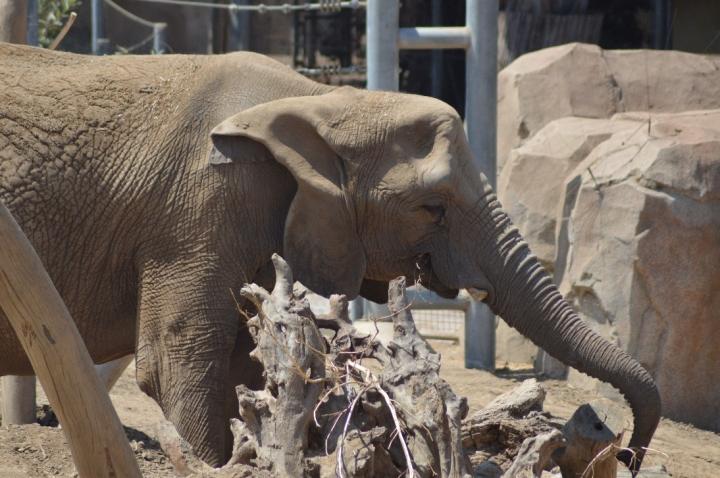Just as humans have their own individual personalities, new research in the Journal of Comparative Psychology shows that elephants have personalities, too. Moreover, an elephant’s personality may play an important role in how well that elephant can solve novel problems.
The article was written by Lisa Barrett and Sarah Benson-Amram in the University of Wyoming’s Animal Behavior and Cognition Lab, led by Benson-Amram. It may be viewed here.
The authors of the paper tested 15 Asian elephants and three African savanna elephants in three zoos across the country — the San Diego Zoo, the Smithsonian’s National Zoological Park and the Oklahoma City Zoo — with the help of elephant caretakers.
Previous work from Barrett and Benson-Amram demonstrated that Asian elephants can use water as a tool to solve a novel problem — and reach a tasty marshmallow reward — in what’s called the floating object task. This time, the authors designed new novel tasks, as well as personality tests, for the elephants.
“We took a comprehensive approach by using three different problem-solving tasks and three types of personality assessments to determine if individual personality played a role in which elephants were able to solve these tasks,” Barrett says. “Since we couldn’t give the elephants a personality test like the ones you’re familiar with online, we had to think creatively.”
The authors developed novel object tests, in which they presented the elephants with an unfamiliar object, a mylar balloon, a burned log and the scent of a predator (lion or hyena), and recorded the elephants’ responses. You can watch videos of the novel object trials: balloon, burned log and urine. They also asked elephant caretakers to fill out a survey about the personalities of the animals in their care; and, finally, they observed the elephants interacting with one another in their zoo habitats.
From those assessments, Barrett and Benson-Amram learned that the surveys and observations were the most reliable methods to get at elephant personality. Overall, Barrett and Benson-Amram measured traits such as active, affectionate, aggressive, defiant, excitable, mischievous, shy and sociable, which have been studied in other animals as well.
“We were eager to see if the personality traits we uncovered through the surveys and observations predicted success on novel problem-solving tasks,” Benson-Amram says. “The elephants had an opportunity to solve each task three times, and we measured if they learned to solve faster over time, and then we traced their success back to their personality type.”
The three problem-solving tasks included the trap tube task, which is a common test used with primates but which had never been presented outside of primates before. You can watch videos of the problem-solving trials: boxed ball, rod ball and trap tube.
Barrett and Benson-Amram found that elephants did learn to solve two out of the three tasks faster over time, even though the elephants only received three trials on each task. Traits including aggressiveness and activity were important predictors of problem-solving overall, but the personality traits measured did not significantly predict learning ability.
This study makes connections between two sources of individual variation, personality and cognition, in threatened species. One reason it is important to examine problem-solving in elephants is that they are faced with new problems that they need to solve regularly in the wild. For example, if certain traits enable elephants to overcome novel problems, elephants may be more likely to invade farmland and contribute to human-elephant conflict. With more research, managers can predict which elephants might overcome or habituate to deterrents, and managers can devote more resources to tracking elephants.
The authors call for more work on different forms of personality assessments to determine which methods would be best for management of zoo and wild elephants.
“Research with free-ranging elephants can extend this study to determine which personality traits are most important for solving novel problems that elephants experience in the wild,” says Barrett, a 2020 graduate of UW’s Program in Ecology and the Department of Zoology and Physiology.
###
Media Contact
Lisa Barrett
[email protected]
Original Source
http://www.
Related Journal Article
http://dx.





